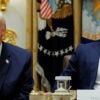In the world of international affairs, popular phrases usually signify not thought, but its absence. Calls for ‘a new Marshall Plan,’ for example, are invariably made by people who know absolutely nothing about the original one. The appearance of these phrases is the surest proof that the speaker is content to think in cliches.
The latest catchphrase is ‘smart power,’ which is what Secretary of State Hilary Clinton has promised the Obama Administration will wield. In theory, ‘smart power’ is the use of diplomacy, economic leverage, military muscle, political suasion, legal structures, and cultural appeals to achieve national ends. In practice, ‘smart power’ is simply a way for the Secretary of State to say that liberals are smart and conservatives – especially those who served in the administration of George W. Bush – are not.
But no one’s against diplomacy, if it works. And cultural appeals sound wonderful too. After all, conservatives believe in the American way of life, and aren’t shy about saying so. The only question is how to go about promoting it overseas. Fortunately, Britain offers some revealing models. There is the British Broadcasting Corporation, for example, or the British Council, a government-funded promoter of cultural relations and educational opportunities founded in 1934.
Both of these are, of course, impeccably liberal-left organizations. The BBC never has a kind word to say about conservatives or Israel, and the Council focuses on programs promoting “English for Peace” and recognizing “Climate Change Champions.”
But that’s not good enough for Iran. In late January, Iran banned the BBC’s Farsi-language TV station and forbid Iranian journalists from working for foreign media. Then, on Wednesday, the British Council’s office in Tehran was forced to close, after the Iranian government summoned the Council’s local staff for interviews and “suggested to them that they should resign from their posts.”
So where’s Britain’s ‘smart power’ in Iran now? It’s nowhere, because that’s where the Iranian government wants it to be. All of the instruments of ‘smart power’ are wonderful for influencing democracies, because they’re open societies. But it’s precisely against the world’s dictatorships that ‘smart power’ is least useful, because they thrive on iron control and have the power to enforce it – if necessary, by threatening the local staff.
In those circumstances, liberals will moan powerlessly – as the CEO of the Council did – about the need to maintain “open and constructive dialogue between countries.” But this isn’t about relations between countries. It’s about relations between governments – in particular, between dictatorial and democratic ones. The more the ‘smart power’ advocates evade that reality, the more the world’s dictators will make them look dumb.































5 Replies to “Dumb Power”